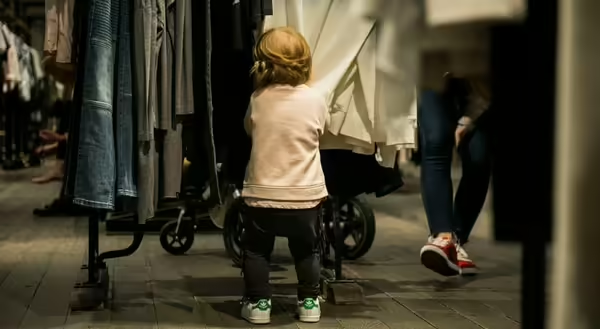
Children can get lost in many places. And at this time of year when we are all doing our holiday shopping, there can be an even bigger risk of a child losing their way. This information is from a new tip sheet by the Illinois Early Learning Project and it provides suggestions for parents and caregivers to prevent children from getting lost and strategies to use if they do get lost.
Prevent – Help children avoid getting lost
- Get oriented – Give the child a tour of any new location, pointing out landmarks. Inform the child of where you’ll be: “I’ll be sitting on this green bench near the slide.”
- Decide on proximity – How close does the adult need to be to monitor the child? In a large and busy city park, the adult may need to follow the child from place to place. In a small park, sitting on a bench to watch could be fine.
- Know the exits – Where are exits? How can adults keep track of activity near those exits? For example, the gym at the community center has two doors leading out into different hallways. The adult may stand near one exit while facing the other.
- Define available areas – Some spaces encourage exploration but are too big for a child to manage. Describe the boundaries “We are in the farming section of the museum now. We’ll visit the mechanic station next. Let me know when you’re ready to move on.”
- Take a picture – Caregivers can take a picture of their child at the start of each day, especially when attending a crowded location (e.g., theme park). It is easier for people to locate them knowing what clothing the child is wearing.
Prepare – Teach children what to do if they get lost
- Memorize key information – Children should know their name, parents’ names, phone number, and address. A song may help children memorize more easily. Sing it often.
- Meet and identify helpers – Teach children to identify safe adults in various locations. Meet them on regular visit to those places. “The workers at the YMCA wear nametags. There is always someone at the front desk. If you are lost, tell a worker. If you are at a place with no workers, look for a parent. Someone with a stroller is a good helper.”
- Practice – Encourage children to practice what they will do if they are lost. “Let’s pretend you don’t see me at the library. Show me what you would say to the librarian at the desk.”
Report – Tell someone if a child is lost
Caregivers may need to seek help locating a lost child. Before any outing, adults should know who to contact in various locations (e.g., guest services at a theme park; security at a mall, or the police in the wider community).
For more information on this topic, go online here
Source: Illinois Early Learning Project